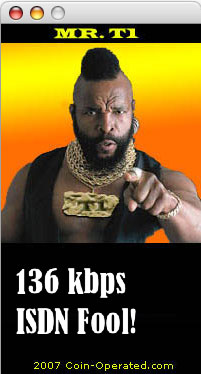Pity the fools at Time-Warner


What costs is two-way bandwidth, equipment to transmit it and the labor needed to install and maintain it. It's the capacity for carrying bits, not the bits themselves, which carry a price.
On that front the news continues to be good. The price of a steady data stream should fall to $5/meg this year, down from $7/meg. It will keep falling thanks to Moore's Law, especially as fiber switching filters into smaller ISPs.
So what excuse can Time-Warner Cable have for charging those who transfer over 50 Gbytes per month as though it were a rural WISP leasing T-1s from a Bell company?
It's the same excuse Comcast has for throttling BitTorrent, namely an effort to protect video revenue streams, and its control of the pay TV business model.
Fact is while most of us on the tech beat have been focused on the Bell-cable duopoly, where the Internet lives, the cable guys have been getting hammered from above by DirecTv.
A single stream to a satellite, and dish antennas, scales better than a wired network. The capital advantages of the dish increase as subscriber counts grow. Consumers pay less for video and get more. Even my mother-in-law has switched.
Since video is the reason the Bells upgraded, and that watering hole is drying up faster than a Georgia lake in a drought, what are the duopolists to do?
Two things. Claim that Internet video is theft, and claim that bits have real costs. Either close off Internet video as illegal, forcing video consumers back to their mall, or charge enough for the bits to justify network upgrades.
It's a short-term plan which depends on the political might of both networks and studios, working together, to force their business model onto consumers, with prices for bits and content rolled-in together and ISPs acting as bankers.
But this is just one direction pay TV business models might take in the future, and the only hope for cable is that the duopoly on last-mile access holds, while the Internet fails to innovate.
If you have a choice beyond metered bits you're going to take it, and the technology trends say that choice is coming, assuming the market is allowed to work its will.
What's needed, still, are working business models for content, both ad-based and subscription, which cut the network operators out and leave them just transmitting bits.
If you look around this site you'll see the start of some. Registration, video ads, premium content, white papers, all the enablers of electronic commerce are going to solve the present bit-cost dilemma, given time.
Once again, the market is going to win. Now you know which fool is to be pitied.